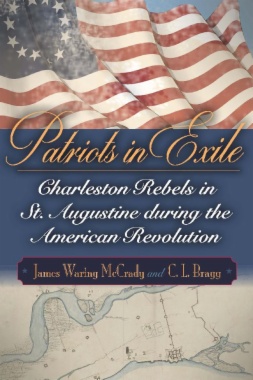In the months following the May 1780 capture of Charleston, South Carolina, by combined British and loyalist forces, British soldiers arrested sixty-three paroled American prisoners and transported them to the borderland town of St. Augustine, East Florida—territory under British control since the French and Indian War. In Patriots in Exile, James Waring McCrady and C. L. Bragg chronicle the banishment of these elite southerners, the hardships endured by their families, and the plight of the enslaved men and women who accompanied them, as well as the motives of their British captors.
McCrady and Bragg thoroughly examine the exile from the standpoint of the British who governed occupied Charleston, the families left behind, the armies in the field, the Continental Congress, and finally the Jacksonboro Assembly of January and February 1782. Using primary sources and archival materials, the authors develop biographical sketches of each exile and illuminate important facets of the American Revolution's southern theater. While they shared a common fate, the exiles were a diverse lot of tradesmen, artisans, prominent civilians, and military officers—among them three signers of the Declaration of Independence. Although they had clear socioeconomic differences, most were unrepentant patriots.
In this first comprehensive examination and narrative history of these patriots, McCrady and Bragg reveal how the exiles navigated their new surroundings within the context of a revolutionary conflict that involved various imperial powers of the Old World—Britain, France, and Spain—and American colonists seeking to create an independent nation.
- Cover�������������������������������
- Patriots in Exile�������������������������������������������������������������������
- Title
- Copyright�������������������������������������������
- Contents����������������������������������������
- List of Illustrations
- Preface�������������������������������������
- Acknowledgments�������������������������������������������������������������
- Prologue����������������������������������������
- Introduction: Two Towns at Odds
- Chapter 1 A Loyalist Embarks on a Secret Mission����������������������������������������������������������������������������������������������������������������������������������������������������������������
- Chapter 2 A Rude Awakening����������������������������������������������������������������������������������������������
- Chapter 3 The Reception at St. Augustine����������������������������������������������������������������������������������������������������������������������������������������
- Chapter 4 The Exiles Settle In����������������������������������������������������������������������������������������������������������
- Chapter 5 A Rather Dull Life of Restricted Routine����������������������������������������������������������������������������������������������������������������������������������������������������������������������
- Chapter 6 Robbery, Religious Differences, and New Arrivals����������������������������������������������������������������������������������������������������������������������������������������������������������������������������������������������
- Chapter 7 A Charge of Haughty and Arrogant Behavior�������������������������������������������������������������������������������������������������������������������������������������������������������������������������
- Chapter 8 The Winter and Spring of 1781�������������������������������������������������������������������������������������������������������������������������������������
- Chapter 9 All Fortunes Reverse����������������������������������������������������������������������������������������������������������
- Chapter 10 Freedom Bound����������������������������������������������������������������������������������������
- Chapter 11 Homecoming�������������������������������������������������������������������������������
- Epilogue����������������������������������������
- Appendix A Who Were the Patriots Exiled to St. Augustine in 1780?�������������������������������������������������������������������������������������������������������������������������������������������������������������������������������������������������������������������
- Appendix B How Many Patriots Were Exiled to St. Augustine?����������������������������������������������������������������������������������������������������������������������������������������������������������������������������������������������
- Appendix C Source Distribution of the Exiles����������������������������������������������������������������������������������������������������������������������������������������������������
- Notes�������������������������������
- Bibliography����������������������������������������������������
- Index�������������������������������

